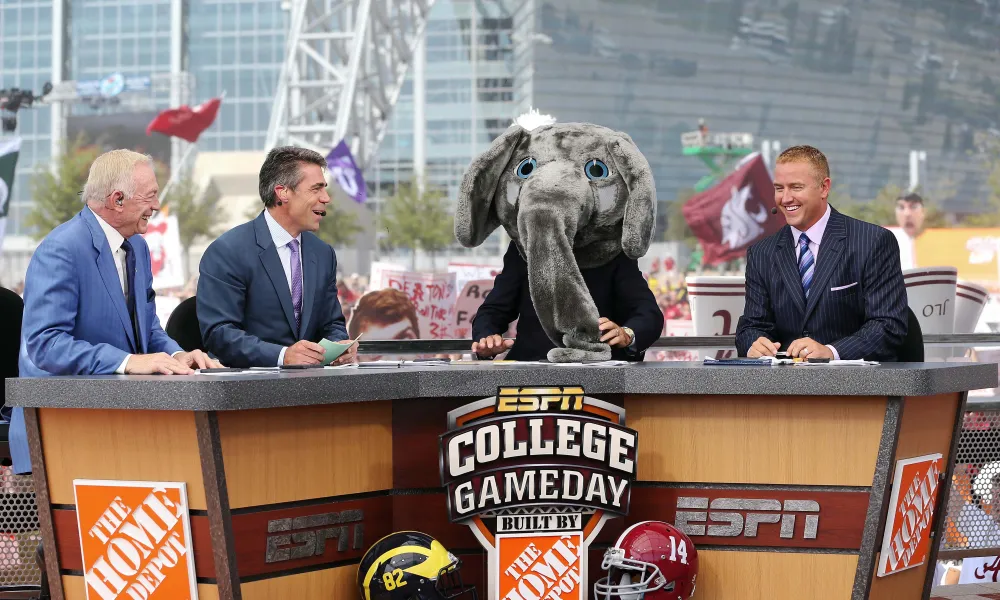College football is the best reality television ever. It has everything you’d want in a reality show.
Drama—A week after needing a miracle to beat lowly Auburn, Alabama ended Georgia’s hopes of back-to-back-to-back national championships by beating them in the SEC title game and securing a spot in the playoff.
Heartbreak—Despite a perfect 13-0 season, Florida State was left out of the playoff and denied a chance at a national championship.
Unexpected twists—Behind superstar head coach Deion Sanders, Colorado started the year by beating 2022 runner-up TCU as 21-point underdogs and climbing to #18 in the polls. They finished the year on a 6-game losing streak and came in last in the Pac-12.
Breakout characters—Connor Stallions, retired Marine and officially a “low-level staffer” wrote a 600-page manifesto detailing a “long-term plan to run the Michigan football program” that included an elaborate sign-stealing operation, resulting in the suspension of head coach Jim Harbaugh.
Redemption stories (apparently)—In 2012, head coach Bobby Petrino skated Arkansas’ code of ethics and various hiring procedures to hire Jessica Dorrell, his 25-year-old mistress, for a recruiting role in the football program. After a suspicious motorcycle crash, an infamous press conference, and a full investigation, the scandal was unveiled, and Petrino was fired in disgrace. Three weeks ago, Arkansas welcomed back “beloved” Petrino as the team’s new offensive coordinator. Evidently, time heals all wounds.
The best way to keep up with the sport’s constant chaos is ESPN’s College GameDay. The show recaps the prior week’s “episode” and frames the storylines for the upcoming games. But the best part of GameDay is the last half hour—the picks segment, where the panelists of experts and a celebrity guest picker predict that week’s games.
The problem is, a sport built on lunacy doesn’t lend itself to predictability.
Having watched GameDay for 20+ years, I know I shouldn’t put much stock into anyone’s picks. The experts, armed with statistics and experience, often do no better than the celebrity pickers. But as a general rule, uncertainty is uncomfortable, so it’s natural to gravitate toward confident-sounding predictions.
I’ve probably spent too much time on this blog poking fun at the inability of others to predict the economy/financial markets. But, it’s a lot of fun and 2023 was a banner year for prognosticators, so let’s do it some more…
Bloomberg Economics foresaw a 100% chance of recession in 2023. Instead, the economy has been astoundingly resilient. Economists should’ve known enough about probabilities to at least say 99% and give themselves a sliver of wiggle room.

October 2023 marked 17 months since the Fed began their rate hiking campaign. The world was just coming around to the idea of “higher for longer” interest rates, so it’s not surprising that “top economists” were unanimously predicting it would continue:

They got the timing almost perfectly wrong (red arrow marking the date it was published). Interest rates peaked one day after their prediction:

“Wall Street Strategists” fared no better. Heading into 2023, they called for a decline in the S&P 500 for the first time since 1999:

As of this writing, the S&P 500 is +26%:

Investors crave predictions because uncertainty is unbearable when your hard-earned money is on the line.
Rather than relying on predictions, a better approach heading into 2024 is to have reasonable expectations based on historical precedent:
• Violence continuing in the Middle East and Ukraine.
• The Fed struggling to balance the fight against inflation vs. keeping monetary policy too restrictive.
• An ugly election cycle.
• Stock prices erratically darting around each day.
• Prognosticators, financial journalists, and commentators crafting compelling narratives around the market’s seemingly random movements and confidently predicting what will happen next.
• At some point in the year, without prior notice, stocks declining 10-15%.
• Despite the chaos that ensues in the meantime, a 75% likelihood that the S&P 500 ends the year higher than it started. And nearly 90% odds that it’s higher by the end of 2028.

My love for college football is rivaled by my love of the stock market. Endless surprises make for thrilling entertainment, but also strike a nerve, highlighting our anxiety about uncertainty. And given the stakes in the stock market—a large chunk of most investors’ life savings—embracing uncertainty feels reckless and potentially humiliating. So, many investors cling to “expert” predictions to avoid the uncomfortable reality of not knowing what’s going to happen next. As author Morgan Housel puts it: “The illusion of control is more persuasive than the reality of uncertainty.” Do yourself a favor in 2024: opt for broad expectations while recognizing the unpredictability of the specifics. Much like anxiously awaiting Corso’s headgear pick, predictions are best used for entertainment purposes only.
Disclaimer: Truepoint Wealth Counsel is a fee-only Registered Investment Adviser (RIA). Registration as an adviser does not connote a specific level of skill or training. More detail, including forms ADV Part 2A & Form CRS filed with the SEC, can be found at TruepointWealth.com. Neither the information, nor any opinion expressed, is to be construed as personalized investment, tax or legal advice. Any reference to an index is included for illustrative purposes only, as an index is not a security in which an investment can be made. Indices are unmanaged vehicles that serve as market indicators and do not account for the deduction of management fees and/or transaction costs generally associated with investable products.
